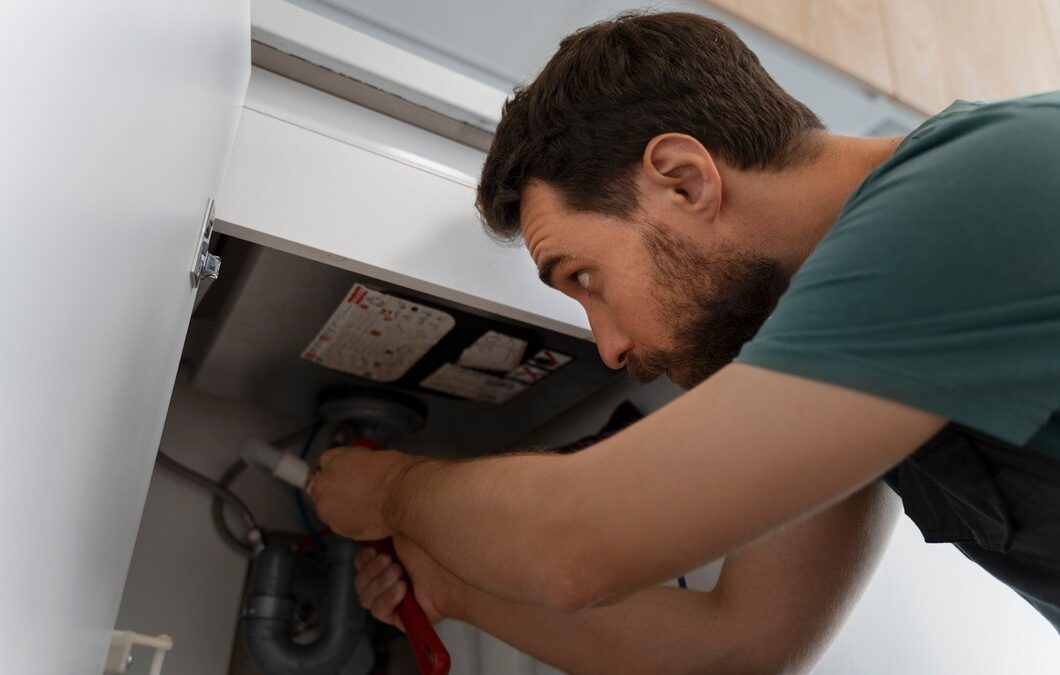Commercial plumbing is a vital part of any business’s day-to-day operations. It involves a network of pipes, fixtures, and systems that handle fresh water and wastewater. These systems are much more complex than the ones found in homes, so regular maintenance is crucial to keep everything running smoothly.
Additionally, routine maintenance ensures that plumbing systems follow all codes and regulations. Businesses can face fines or shutdowns if their plumbing doesn’t meet standards. Routine checks and fixes can save time and money by avoiding these issues. By understanding the need for regular maintenance, businesses can keep their plumbing systems reliable and efficient, helping to prevent costly repairs and downtime.
Understanding Commercial Plumbing Systems: What Makes Them Different?
Commercial plumbing systems are more intricate than residential ones. They handle more water and waste, meaning they must be more robust. These systems often include multiple floors and various water demands. For example, an office building might need a reliable water supply for restrooms, kitchens, and specialized equipment like water-cooling systems or fire sprinklers.
Another difference is that commercial plumbing must follow strict city codes and regulations. These laws ensure safety and hygiene for everyone using the facility. Non-compliance can lead to fines or even business closures. Therefore, commercial plumbing systems require regular monitoring and maintenance to meet these standards.
Finally, commercial plumbing often involves multiple users. This means the system experiences more wear and tear. Heavy usage can lead to frequent issues like clogs, leaks, and pressure problems if not well-maintained. A well-maintained system ensures smooth operation, avoiding disruptions that could affect business activities. Knowing these features helps to understand why regular maintenance is so essential.
Top Benefits of Regular Maintenance for Commercial Plumbing
Preventing Major Breakdowns
Regular maintenance helps catch minor issues before they turn into big ones. For example, a minor leak in a pipe can seem like a small problem. However, it can lead to significant water damage and expensive repairs if not fixed. Routine checks can identify and resolve these issues early, saving money and preventing substantial headaches.
Ensuring Compliance with Codes and Regulations
Maintaining commercial plumbing systems is essential for complying with local building codes and health regulations. Regular inspections ensure everything is up to code, which can prevent fines and keep the business running smoothly. Meeting these standards also helps ensure the safety and well-being of everyone in the building.
Extending the Lifespan of Plumbing Systems
Just like any other system, regular care extends the lifespan of plumbing systems. Well-maintained pipes, fixtures, and pumps last longer, which means fewer replacements and less disruption to business activities. Extending the life of plumbing components also saves money in the long run.
Improving Water Efficiency and Reducing Costs
Regular maintenance can also improve water efficiency. Fixing leaks and using efficient fixtures reduce water wastage. Lower water usage means lower utility bills, which is a win-win for businesses looking to cut costs. Simple actions like fixing a leaky faucet can save gallons of water each month, helping the company and the environment.
Common Issues in Commercial Plumbing That Regular Maintenance Can Prevent
Clogged Drains and Sewer Lines
Clogged drains and sewer lines are common in commercial buildings. Grease, food particles, paper products, and other debris can cause clogs. Regular maintenance, including cleaning the pipes, can help prevent these issues. If left untreated, clogs can lead to slow drainage or complete blockages, disrupting normal operations and resulting in costly repairs.
Leaky Faucets and Pipes
Leaky faucets and pipes can waste a significant amount of water. Even a tiny drip can lead to gallons of water wasted each day. Regular inspections can catch these leaks before they become more noteworthy problems. Fixing them promptly can prevent water damage to the building and reduce water bills.
Water Heater Failures
Water heaters are essential for many commercial operations. A failure can disrupt daily activities and even cause safety hazards. Routine checks ensure that water heaters are functioning properly. This includes checking for any sediment build-up and ensuring all parts work efficiently. Regular servicing can extend the water heater’s life and prevent unexpected breakdowns.
Low Water Pressure
Low water pressure can affect everything from restrooms to kitchen operations. It can indicate underlying issues like leaks, clogs, or problems with the main water line. Regular maintenance can identify the root cause of low water pressure and fix it before it leads to more severe issues.
Essential Maintenance Tasks for Commercial Plumbing Systems
Regular Inspections and Diagnostics
Regular inspections and diagnostics are crucial for keeping a commercial plumbing system in good shape. This includes looking at pipes, fixtures, and appliances for any signs of wear and tear. Diagnosing issues early helps in planning repairs and avoiding unexpected problems. Inspections should be scheduled periodically to catch any potential issues before they escalate.
Pipe and Drain Cleaning
Cleaning the pipes and drains is essential to prevent clogs and blockages. Over time, debris can build up, making it hard for water to flow smoothly. Regular cleaning ensures that pipes are clear and free from obstructions. This task improves water flow and reduces the chances of emergency repairs.
Testing and Servicing Water Heaters
Water heaters need regular testing and servicing to ensure they are working efficiently. This includes checking the temperature settings, inspecting the tank for sediment build-up, and ensuring all parts are in good condition. Regular servicing can prevent breakdowns and extend the life of the water heater.
Backflow Prevention and Testing
Backflow is a serious issue that can contaminate a building’s water supply. Regular testing and maintenance of backflow prevention devices are essential. These devices ensure that water flows in the right direction and prevent contamination. Routine checks and maintenance keep the water supply safe and meet regulatory standards.
Conclusion
Regular maintenance of commercial plumbing systems ensures smooth operations and prevents costly repairs. Businesses can avoid major disruptions by tackling minor issues before they become big problems. Compliance with local codes and regulations also helps keep everyone safe and the business running smoothly. Extending the lifespan of plumbing fixtures and improving water efficiency can save significant costs over time.
Taking these steps ensures a reliable plumbing system and supports the overall efficiency and hygiene of the business environment. Don’t let plumbing issues disrupt your business. For dependable and professional commercial plumbing services, contact Plumb Krazy Plumbing. We offer tailored solutions to keep your business running smoothly. Let’s ensure your plumbing system stays in top shape.

